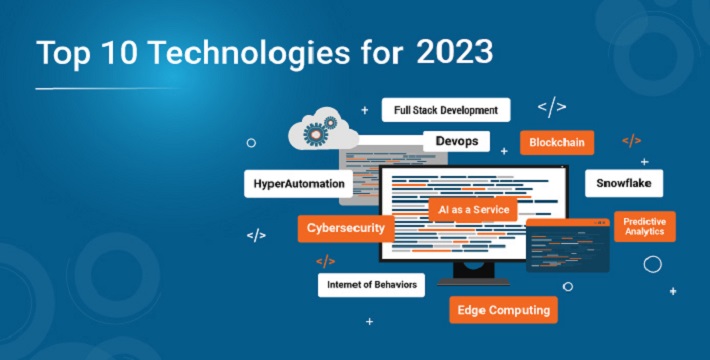
The world of software development is constantly evolving, and staying on top of the latest trends is crucial for software developers and tech companies alike. As we move into 2023, here are the top 10 trending software development technologies to keep an eye on:
Artificial Intelligence/Machine Learning
Artificial Intelligence (AI) and Machine Learning (ML) have been on the rise for several years now, but they continue to be at the forefront of software development trends. AI and ML technologies can be used in a variety of applications, from chatbots to predictive analytics and beyond. With the rise of IoT devices and big data, AI and ML are becoming more essential than ever for efficient and effective data processing and analysis.
Blockchain
Blockchain technology has been around for a few years now, but it is still relatively new and has a lot of potential for innovation. Blockchain technology is a decentralized ledger that can be used for secure transactions, data management, and more. In the coming years, we can expect to see more widespread adoption of blockchain technology and new applications for its use.
Low-code/No-code Development
Low-code and no-code development platforms are making it easier for non-developers to build software applications. These platforms allow users to drag and drop pre-built components to create custom applications, without requiring extensive programming knowledge. With the demand for software development increasing faster than the supply of developers, low-code and no-code development will become more popular in the coming years.
Progressive Web Apps (PWAs)
Progressive Web Apps (PWAs) are web applications that provide a native app-like experience for users. PWAs can be accessed through a web browser but offer features such as push notifications, offline access, and more. PWAs are becoming more popular as they can be developed more quickly and cost-effectively than native apps.
Cloud Computing
Cloud computing has been around for several years, but it continues to be a popular trend in software development. Cloud computing allows businesses to access computing resources on-demand and scale up or down as needed. With the rise of the remote workforce, cloud computing is becoming increasingly essential for businesses to operate efficiently.
Internet of Things (IoT)
The Internet of Things (IoT) refers to the interconnected network of physical devices, vehicles, and other objects that are embedded with sensors, software, and network connectivity. IoT technology has a wide range of applications, from smart homes to industrial automation and beyond. In the coming years, we can expect to see more widespread adoption of IoT technology and new applications for its use.
Serverless Computing
Serverless computing allows developers to write and deploy code without the need to manage infrastructure. With serverless computing, developers only pay for the actual compute time used, which can be more cost-effective than traditional server-based infrastructure. Serverless computing is becoming more popular as it allows for faster development and deployment of applications.
DevOps
DevOps is a set of practices that combines software development and IT operations. DevOps aims to increase collaboration between development and operations teams to improve software development processes and reduce time-to-market. DevOps has been a popular trend for several years now, and we can expect to see continued growth in the coming years.
Cybersecurity
Cybersecurity has always been important in software development, but it has become even more critical in recent years. With the rise of cyberattacks and data breaches, companies are investing more in cybersecurity measures to protect their data and systems. In the coming years, we can expect to see even more focus on cybersecurity in software development.
Quantum Computing
Quantum computing is still in its early stages, but it has the potential to revolutionize software development. Quantum computers use quantum bits (qubits) instead of traditional bits to perform calculations,
Source: www.websolutioncentre.com